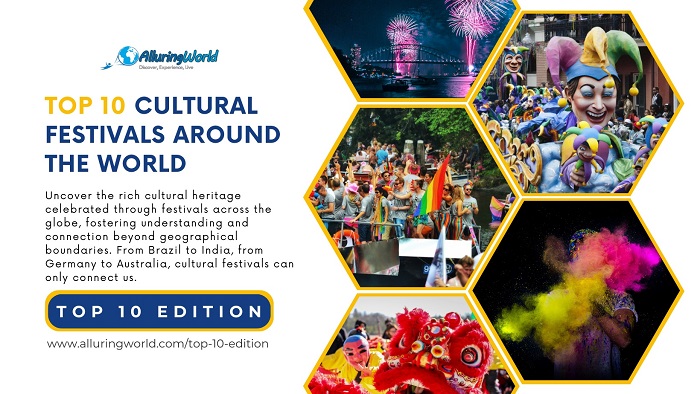Cultural Festivals Around the World: Celebrations Beyond Borders
Cultural festivals are vibrant expressions of humanity’s diverse heritage, embodying traditions, beliefs, and histories that transcend borders and bring people closer together.
Whether colorful parades, solemn rituals, or lively celebrations, festivals provide a powerful window into the unique customs of different communities worldwide.
They encourage global understanding and appreciation by creating opportunities for cultural exchange, shared experiences, and joyous gatherings.
From spirited dances in Brazil to playful water fights in Thailand, each festival is a testament to the creativity, resilience, and unity that define human civilization.
1. Rio Carnival, Brazil
The Rio Carnival is perhaps the most iconic celebration worldwide, known for its dazzling parades, lively samba dancing, and elaborate, colorful costumes.
Each year, millions gather in the streets of Rio de Janeiro, transforming the city into an electrifying mosaic of music, dance, and joyous energy.
Beyond its spectacle, the carnival deeply symbolizes Brazil’s rich cultural heritage, showcasing Afro-Brazilian traditions blended with Portuguese influences.
2. Holi, India
Known globally as the Festival of Colors, Holi is a vibrant celebration where participants enthusiastically throw colored powders and water balloons at each other, painting the streets and faces in brilliant hues.
It symbolizes the arrival of spring, renewal, and unity, breaking social barriers and bringing people together. Holi not only creates unforgettable memories but also embodies the joyous spirit of community and friendship.
3. Oktoberfest, Germany
Germany’s Oktoberfest is a globally renowned festival, highlighting Bavarian culture through traditional beer-drinking rituals, authentic cuisine, and folk music.
Held annually in Munich, it attracts visitors from around the world eager to partake in this festive atmosphere filled with laughter, camaraderie, and celebration of historical traditions. Oktoberfest showcases the heart of German hospitality and cultural pride.
4. Dia de los Muertos, Mexico
Dia de los Muertos, or the Day of the Dead, is a deeply significant festival celebrating life and honoring ancestors.
Families create vibrant altars adorned with marigolds, photographs, candles, and intricate sugar skulls.
It emphasizes remembrance and joy rather than sorrow, fostering a profound connection between the living and the deceased, highlighting the importance of family bonds and cultural continuity.
5. Chinese New Year, China
Chinese New Year is an elaborate celebration featuring dragon dances, red lanterns, fireworks, and family reunions, marking new beginnings and prosperity.
Rich with symbolism, this festival is steeped in traditions intended to usher in good fortune and luck for the upcoming year. Families worldwide participate by sharing meals, exchanging gifts, and enjoying cultural performances.
To further engage younger family members, parents often integrate fun and educational math exercises, adding an interactive and enriching dimension to the celebrations.
6. Songkran, Thailand
Songkran marks the Thai New Year with enthusiastic water fights across the nation. Streets become joyous playgrounds, with locals and visitors splashing water on each other, symbolizing cleansing and renewal.
This playful interaction fosters a strong sense of community, marking a fresh start with goodwill and laughter.
7. Mardi Gras, New Orleans, USA
Mardi Gras in New Orleans epitomizes cultural diversity through vibrant parades, lively jazz music, elaborate floats, and flamboyant costumes.
Originating from French, African, and American cultural intersections, it embodies a spirited celebration of life, freedom, and community unity that captivates millions annually.
8. La Tomatina, Spain
La Tomatina is a unique festival characterized by its famous tomato-throwing battle. Held in the Spanish town of Buñol, thousands gather to playfully hurl tomatoes, turning streets into a sea of red pulp.
What started as a local tradition has grown into an international spectacle, emphasizing community spirit, fun, and cultural curiosity.
9. Sydney New Year’s Eve, Australia
Sydney New Year’s Eve is celebrated with breathtaking fireworks and spectacular performances around its iconic harbor.
Attracting international audiences, the festival promotes inclusivity and diversity, uniting people from different backgrounds in a shared moment of joy and anticipation for the new year.
10. Amsterdam Pride, Netherlands
Amsterdam Pride features a spectacular canal parade celebrating the LGBTQ+ community, promoting acceptance, diversity, and freedom of expression.
Colorful floats and vibrant costumes fill the waterways, making it one of Europe’s most prominent Pride events.
Those seeking distinctive festival attire often visit the popular femboy clothing store, highlighting individual expression during this inclusive celebration.
In conclusion, cultural festivals around the globe profoundly demonstrate the value of diversity, unity, and human connectivity.
Participating in or observing these vibrant events offers invaluable experiences, enriching our global perspectives and fostering mutual understanding.
For those looking to immerse themselves in these international celebrations, practical arrangements like a bond payment plan can simplify travel and accommodation logistics.
Ultimately, embracing cultural festivals allows us to appreciate humanity’s vast tapestry, bridging borders and celebrating life in its myriad forms.

